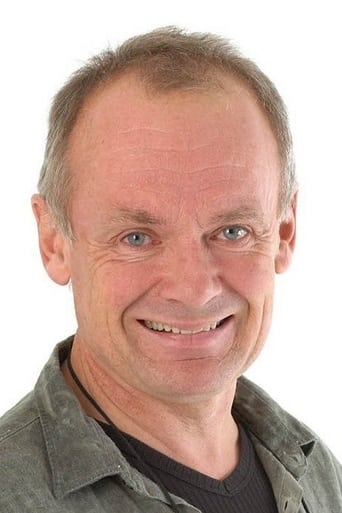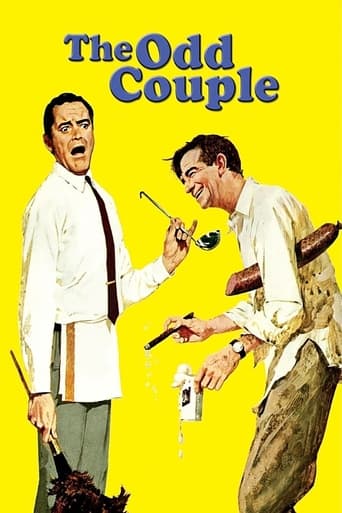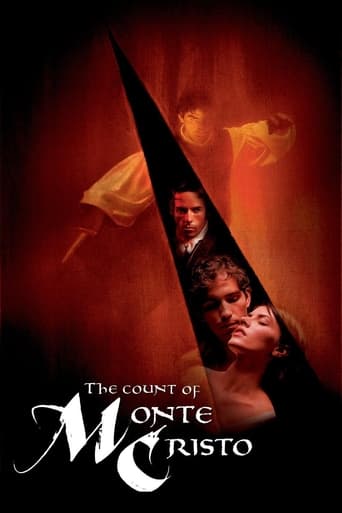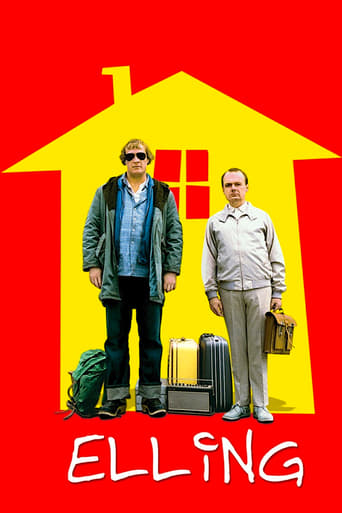
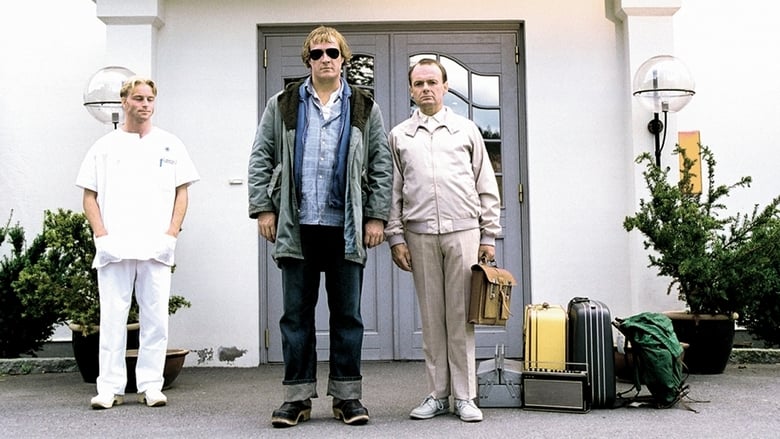
Elling (2001)
40-year-old Elling, sensitive, would-be poet, is sent to live in a state institution when his mother, who has sheltered him his entire life, dies. There he meets Kjell Bjarne, a gentle giant and female-obsessed virgin, also in his 40s.
Watch Trailer
Cast


Similar titles
Reviews
Yawn. Poorly Filmed Snooze Fest.
Excellent but underrated film
Absolutely Fantastic
This is a small, humorous movie in some ways, but it has a huge heart. What a nice experience.
Inspired by Lars von Trier's "The Idiots" to come up with a kinder, gentler film and a chance for Gerard Depardieu's stunt double to get a starring role.....um.....no.I actually thought the earlier review and "The Odd Couple" reference is pretty spot on. And as that spawned a TV show, apparently this comes as part of a trilogy. That kind of surprised me.The film will not surprise so much, but if you let yourself not worry about the diabetes of your soul and enjoy the treacle, it works just fine. I watched the first maybe 2/3 the night before, and for whatever reason was thinking more about adults in such situations, woke up and then accepting these dramatic devices to portray some simple cinematypes (uptight outcast who must accept himself and others pitted next to the heart-of-gold headless hoss-hunk) and sure you root for them knowing that, unlike in life, their happiness is guaranteed, and they will find a way in the world.I did enjoy the professor/poet introduction much more than the hoss-hunk's heroine.And the message that pretty much all people feel like outcasts who don't fit in, but plenty of us (well maybe not me, so plenty of you) find a way somehow is reassuring.
Elling a "momma's boy" is a middle-aged man who has been living with his mother his whole life until she dies. Elling goes crazy and becomes socially awkward and is forced to live in mental center. There he meets his roommate and long-time friend Kjell Bjarne who has a disorder where all he thinks about is women and sex. Eventually the end up being released from the mental hospital and are forced to live with each other. Every once in a while they have a social worker who checks in on them to see if they are capable of living on their own. They face many different obstacles in their time together along with overcoming their mental disabilities.Per Christian Ellefsen portrays Elling as a quiet, neat freak. I feel Elling has the most difficult adapting to daily life and the outside world. Having his character be a neat freak compels his disability. He is the probably the most difficult character to figure out, because you really don't ever understand what his emotions are. Although there are scenes where one may be able to understand his character, but I feel the director made it too difficult for viewers to understand whom Elling really was. Kjell Bjarne on the other hand is a man who is trying to break out of his element and reunite with the outside world. I feel the director made his character better noticeable because I feel his character was simpler. I'm still confused though why does he always insist on hitting his head on tables and pounding his fist on walls. One could say he is a very angry person, but I don't feel that at all. His love for his girlfriend abolishes this idea of him being angry.The main theme that I took from this movie was the idea of family. The idea of Elling and Kjell being together demonstrates how the director enhances this theme of family. Considering this is a Norwegian film and the value of nature is portrayed in many films does not seem to be an important theme for this movie. Most of the movie is filmed in a big city. I was expecting more scenes involving the aspects of nature to be enhanced in this movie. There is a scene where they all go to a cabin and this would contradict my previous statement, but this scene doesn't play a significant role in the movie.The movie is considered as a comedy and I would have to disagree. There were times where only a few times where I would laugh, but overall I wouldn't say it is a comedy. Maybe I don't have a sense of humor or maybe Norwegian comedies are different compared to American films, but I feel the movie was more considered as a drama rather than a comedy. Elling is supposed to be the main character and one would think if the movie was supposed to be a comedy, the main character would be the most funny. I believe Kjell is bar far the funniest actor just because he is a slob and doesn't know when to change his underwear. Elling to me is more serious all the time and even though his seriousness can sometimes to funny, in order for a movie to be considered as a comedy, the main character has to always be funny.Overall I really enjoyed the film, because I feel the message from the movie can be seen around the world. There are many different people who have difficulty associating them with the outside world. I myself have difficulty talking to complete strangers and this movie has made look at things differently. I also feel the location, lighting, etc. was very well used to enhance the director's purpose of the movie. I wouldn't say this was the best movie I have ever watched before which is why I only rated the movie and 8 out of 10. I wouldn't say this is the type of movie someone would want take a date too, but if someone wants to watch a movie on a rainy day and curl up on the couch, this would be a perfect movie for this situation.
Elling, a gentle Norwegian comedy by Petter Næss, was one of my favorite Norwegian films. Nominated for an Academy Award for the best foreign movie-which was well deserved-observes the day-to-day rehab of two middle-aged men upon their release from the local mental hospital. They were roommates at the hospital, and the film follows them as they continue to be roommates n their assigned state-sponsored apartment in Oslo. The "couple" is forced to overcome their compulsions and phobias in order to learn and navigate in the real world in the most simplistic ways. As far as themes go, this is a very Nordic film. Petter brilliantly probes into mental illness, the welfare system, politics, and substance abuse, and family in a comical way that keeps the audience entertained, while still managing to make it mellow dramatic.One prominent theme portrayed, which is greatly contrasted to that of the States and which I was thoroughly impressed by, was the welfare system. Elling, a prudish momma's boy scared to even cross the street played by Per Ellefsen, and Kjell, an outward oaf with an obsession of women but contrasted with a gentle soul played by Sven Nordin, are well taken care remarkably well. Rather than being bombarded with prescription drugs to cope, these two are put up in comfortable living quarters –which appears to come at no cost to the two. They are visited regularly by a social worker, Frank-played by Jørgen Langhelle, who assists them in developing these everyday skills, often through tough love, and monitors their progress. One of my favorite scenes is when Frank is teaching the two, mainly Elling, how to use a phone. Elling is terrified of the phone-probably much similar to a persons fear of heights or maybe public speaking- and refuses to pick up the phone when it rings, claiming his mother always handled the phone. Petter does a good job of making it comedic in the way he portrays this, using intensifying music and a series of cuts to show the length of time it took Frank to teach Elling this simple skill.In probing into mental illness, Petter manages to avoid using any medical lingo to describe their illnesses. It is blatantly obvious that there is something wrong with these two, but Petter's reluctance to identify these issues keeps the characters human, and allows the audience to sympathize and connect more with the characters. Being a comedy, the audience is able to laugh WITH the characters rather than laugh AT them. Elling and Kjell are merely oddballs given the chance to become less sheltered and function in everyday society. And as much as Frank is there to help them, the relationship developed and support given between the two is ultimately the focal point of their progress. Elling no longer has his mother, and so Kjell has replaced her as Elling's day-to-day contact and support. The relationship developed between the two has become their new families. And their dependence on each other is apparent, especially later in the film when Kjell is moving along quicker than Elling is, and there is a scene where Elling has a mini freak-out. He has this mini freak-out for fear of loneliness and losing his "family" again.There are subtle references to politics throughout the movie. Elling is obsessed with Gro, a popular leader of the labour party. He is appalled when eating at his neighbor's, Alfons played by Per Christensen, house and Alfons' wife makes a negative comment about Gro and Elling gives her a piece of his mind. It was amusing to see how much he worshipped Gro, who along with Kjell, has somewhat replaced Elling's mother.As the two progress and begin to get their feet wet in the real world, they begin to see the real world's terrors. There is a big change in their lives when they come across a drunken neighbor, Reidun played by Marit Jacobsen, in their apartment complex, who happens to be pregnant! This scene while relatively comical and over exaggerated, gives us an insight to the role drinking plays in the Nordic lifestyle. But anyways, Reidun is essentially the catalyst to the Elling and Kjell's separation and independence. Elling becomes infatuated with his alternate ego, The Sauerkraut Poet, and frequents poetry clubs. One of my favorite Norwegian films, Petter Næss delves into Nordic themes-welfare system, mental illnesses, politic, family, and substance abuse- commonly portrayed in other Nordic films, while managing to do so in a comical manner that allows the audience to connect to the characters. His ability to gain sympathy from the audience, while also allowing them to laugh WITH the characters, rather than AT them is a major reason this movie appeals to me.
Sometimes, the smallest rocks make the biggest ripples. This is certainly the case in Peter Næss' Elling, where the bond between two friends affects lives both on-screen and off. While elements of a commentary on Norwegian mental health are present, the film's strengths rely heavily on the friendship between the main character Elling and his roommate Kjell Bjarne as they traverse a world familiar to us, but new to them.Part of what makes Elling so enjoyable is its ability to engage the audience's personal history. Per Christian Ellefsen plays the high-strung Elling as he attempts to adapt into contemporary society. Found alone after his mother's death, he is sent to a state-funded institution in Oslo to learn how to live within the realm of the general public. There, he is paired with another patient who, through sexually-charged escapades, bring the two outside the city and into the dangerous outdoors. But the danger isn't nature - it's society. Elling's nervous troubles, combined with effective filmic techniques, mirror the struggles that many viewers may have faced when trying to fit into the world around them. Elling's experiences are amplified, however, by an unnamed and crippling mental disorder that causes him to collapse, sometimes literally, at the thought of social interaction. Several plot points in the film are dedicated to Elling's adventures into the dangerous public sphere around him. One such instance involves Elling's attempt to visit the local store to obtain groceries. The camera stands far back, revealing the wide scope of the world that Elling must conquer in order to achieve his goal. The sounds of traffic are artificially enhanced as Elling slowly waddles to his destination. The audience then finds him slumped on the ground outside the store, unable to will himself inside. At first, Elling fails miserably with every attempt to adapt, giving in to his hesitations and concerns. The film concludes lightheartedly, though, and the audience is left with little less than admiration for Elling. The film's ability to allow audiences to relate to the unfolding drama is part of what makes it such a satisfying product to watch.Another of Elling's strengths is the use of the dynamic between the two leads. Juxtaposing the stickler-like behavior of Elling is the gentle brute Kjell Bjarne, played by Sven Nordin. The two are paired in an attempt to better rehabilitate each other, and their humorous differences are what drive the film. The several instances of Elling criticizing Kjell Bjarne for his reckless behavior are the most memorable moments of Elling. For example, when Kjell Bjarne begins aiding a sickly woman named Rediun (played by Marit Pia Jacobsen) in a nearby apartment, Elling bombards his friend with a worry-filled rant before Kjell Bjarne forcibly inserts Elling into bed for the night. As the film progresses and Elling begins to understand the world around him, it becomes clear that it is Kjell Bjarne's friendly influence that helps expedite Elling's recovery.Elling also serves, in a broader sense, as a commentary on mental health in Norway and its treatment. Director Peter Næss explicitly stated that he "did not want to make the film about psychiatry." He achieves this desire by purposefully avoiding the specific disabilities that plague both Elling and Kjell Bjarne. Instead, the details are left to the viewer's imagination. In addition, Næss uses the character of the social worker Frank, played by Jørgen Langhelle, to help mediate the societal adaptation for the two main characters. However, Frank is not gentle in his assistance and is quick to anger. One scene pits Frank against Elling as the social worker teaches proper telephone-answering behavior. Elling's insecurities cause the scene to erupt into a shouting match about the practicality of plastic speaking devices. Serving as a tough-loving father figure for the two men, Frank represents the Nordic state and its solution to the mentally handicapped.Films like Elling are unfortunately few and far between. Many films fail to capture the universality of the main character's situation quite like Næss has done. And compared to other Nordic films, Elling is certainly a step away from its overtly tense and sexually- prevalent peers. Although the film failed to win the "Best Foreign Film" Oscar, Elling is, to this day, one of this reviewer's personal favorites. Its uplifting message and enjoyable story continue to positively affect my perspective of quality films. As I watch and share with others, its influence spreads, like ripples in a pond.


